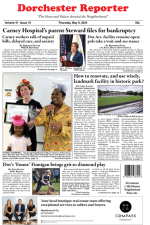December 29, 2021
Thank you, Mayor Wu, for choosing public health over fear and superstition by requiring proof of vaccination for indoor venues. Please don’t stop there. Distribute free rapid tests, stay the course on masking, and continue to learn from the mistakes we have made since the first outbreak in Wuhan, China, in December 2019. Mistakes that have resulted in 815,000 American deaths to date.
What went wrong? As we enter the Covid pandemic’s third year, this question is more urgent than ever. What can we learn from these deadly mistakes to avoid repeating them when the next pandemic sets in?
Lesson One: Pandemics recur.
Although many would have you believe that Covid-19 was unforeseen, and how it would act unknown, this is untrue. The world has experienced many viral outbreaks over the years, not just the Bubonic Plague of the 1300s, but many over the past few decades. We’ve had SARS 1, MRSA, Bird Flu, Ebola, and many other outbreaks, and our federal government knows that these infectious diseases can pop up.
In fact, the Obama administration established a department within Health and Human Services to prepare for just such an outbreak. In 2018, Bill Gates, in addressing the Massachusetts Medical Society, cited the danger of a pandemic hitting the US “in our lifetime,” and a report from the Institute for Disease Modeling predicted that if a contagious, lethal, and airborne pathogen on the order of the 1918 flu pandemic hit the US, it could result in millions of deaths.
Lesson 2: Viruses know no borders.
Global problems demand global solutions. We knew, and know, that viruses mutate, and that mutation can occur as the virus is transmitted to a new host. We also knew, and know, that it is impossible to prevent the virus from going across national borders, which meant that efforts to stop the virus through vaccination had to be world-wide. To date, we have failed to act as unified planet, with the result of surge after surge of cases.
Lesson 3: Masks work.
Even in 1918, our government officials knew that masking would help, but when Covid hit us in February 2020, the US Surgeon General tweeted that masks “are NOT effective in preventing general public from catching #Coronavirus,” remarks that were walked back by April, but after many thousands of people were exposed to Covid. While China produced 200 million face masks a day, we were asking people to make their own, and fighting the first battle of the Covid culture war over the coverings.
Lesson 4: Rapid testing works.
We knew that testing was essential, and many virologists urged our government to produce antigen tests that would be cheap, quick, and ubiquitous. Antigen tests can tell whether a person is infectious, and, if easily available and cheap, could have been used daily to identify new cases and get our children back into school sooner. But our government insisted on polymerase chain reaction (PCR) testing as the standard, despite the fact that they take days to get results and are costly. In the beginning of the pandemic, we only tested symptomatic patients despite the fact that a large percentage of positive cases were asymptomatic but still capable of transmitting the virus. Now that antigen tests (the 15-minute tests) are seen as reliable, we can’t find them in stores.
Lesson 5: Vaccines work.
In short, our scientists and doctors knew what needed to be done to get ahead of the virus, but leadership ran behind the science, instead focusing on how quickly we could stop wearing masks and get the economy moving, walking the tightrope between the anti-vax, anti-mask demonstrators and the public health scientists.
Lesson 6: View a global pandemic as a war against a mutating virus. Mobilize all resources.
What could have been done? We have lost more than 800,000 Americans to Covid-19. If we were at war and losing hundreds of thousands of Americans, our presidents would have invoked the Defense Production Act to produce enough weapons and materiel to fight the war. Though both presidents Trump and Biden invoked the act in our war on Covid, their actions were neither sufficient nor soon enough nor at the levels needed to fully curtail the virus.
What did work? Science. Despite dealing with a new virus, our medical and science communities figured out early methods to preserve life, such as positioning patients and providing anti-coagulants and steroids in early months of the pandemic, then developing the vaccines and drugs that have been able to dramatically lower the death rate among the vaccinated.
This pandemic has lasted much longer than it should have as variants continue to crop up because we aren’t vaccinating everyone, and because we lack the political will to mandate the vaccine, as we mandate all the other routine vaccines from measles to polio.
Our leaders have reminded me of Alexandre Ledru-Rollin’s famous quote: “There go the people. I must follow them for I am their leader.”
When the next pandemic arrives, it would be great if leaders make decisions to protect people from the virus, even if there is opposition;, trust science and those who understand the disease we’re fighting; and understand that America First doesn’t apply to viruses.
Bill Walczak is a Dorchester resident and the former CEO of Codman Square Health Center, which he helped to start in the 1970s. His column appears regularly in the Reporter.



